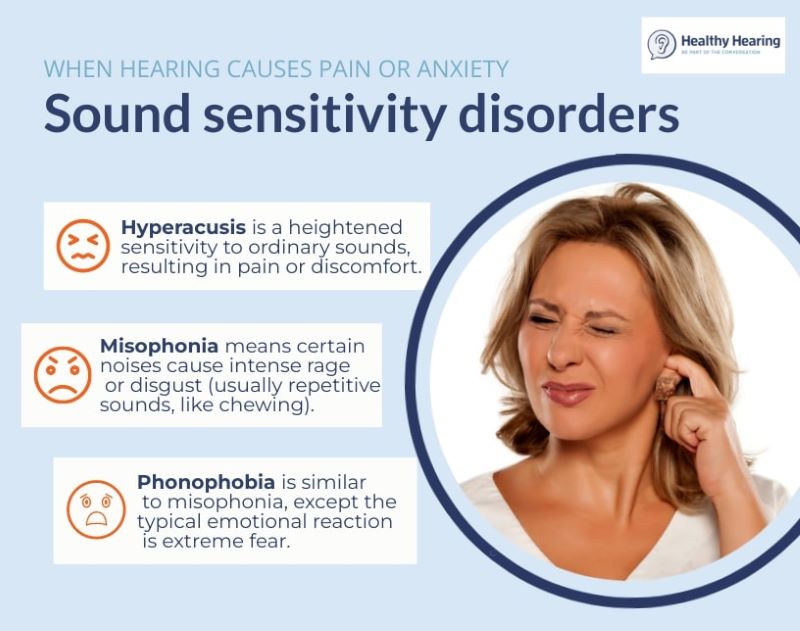|
www.HealthyHearing.com |
Sound hypersensitivity disordersSymptoms and treatments for hyperacusis, misophonia and phonophobia
Contributed by Madeleine Burry The crunch of someone biting into an apple, or the wet smack of wads of chewing gum. The pop of a balloon. A stream of running water. The slam of a door. For people with sound hypersensitivity disorders, everyday, ordinary sounds like these can cause pain, discomfort, anger, or fear. All of these disorders affect a person's quality of life and range from mild to severe, notes retired research audiologist James Henry, Ph.D., author of “The Hyperacusis and Misophonia Book." Let's take a look at the different conditions, and how they're diagnosed and treated:
HyperacusisWhat is it?Put simply, people with hyperacusis are very sensitive to sounds. “If you're dealing with hyperacusis, daily noises like a faucet running, people talking, or even background hum can be overwhelming and worry-inducing,” says otolaryngologist Dr. Don Beasley, MD, head of Boise ENT. It typically causes two different types of sensitivity. The first, loudness hyperacusis, cause normal sounds to cause uncomfortable physical sensations, such as ear fullness, ear pain or headaches. The second, pain hyperacusis (noxacusis), causes a burning or jabbing sensation in the ears, notes Dr. Henry. What causes it?It’s typically the result of some sort of damage or dysfunction to the hearing system, Dr. Beasley notes. “It can be triggered by things like exposure to loud noise, head injuries, migraines, or ear infections. Conditions like Bell’s palsy or issues with the temporomandibular joint can also trigger it,” he says. Other conditions that are linked to hyperacusis include Meniere’s disease, Lyme disease, Williams Syndrome (a genetic condition), PTSD, epilepsy, cerebral palsy, and autism, according to Melanie McQueen, AUD, CCC-A, assistant director of audiology at Livingston Hearing Aid Center. Some people with hyperacusis also have reactive tinnitus, or ringing in the ears that is triggered by noise. This hearing disorder is rare, affecting about 1 in 50,000 people, and is more common among people with tinnitus, notes the American Speech-Language-Hearing Association. Treatment options“Although there is no cure for hyperacusis, there is hope,” McQueen says. One key to treatment is to consider the underlying cause of the condition, as well as its severity, Dr. Beasley says. Some treatment options include:
MisophoniaWhat is it?People with misophonia have an aversion to certain specific noises, which may differ from person to person. “These sounds are usually repetitive and commonly associated with human actions, like chewing, breathing, pen clicking, or finger tapping,” says Shmaya (Steven) Krinsky, PsyD, founder of Anxiety and Behavioral Health Psychotherapy. Everyone has sounds that feel a bit annoying. Misophonia goes beyond that. These sounds “trigger intense emotional reactions — rage, panic, or disgust. It’s not just ‘annoyance’; it’s a visceral response that can strain relationships and isolate sufferers,” says Clint Kreider, LMFT, clinical director of Stillwater Wellness Group. Because the reaction is so intense, it can lead to people developing coping strategies that distance them from others. "Many people with misophonia describe feeling trapped when they hear a trigger sound, as if their brain is stuck in a fight-or-flight response," Krinsky says. "I’ve worked with clients who completely avoid family meals because the sound of chewing makes them feel enraged or panicked. Some even wear noise-canceling headphones at work to avoid distress from coworkers' habits, like keyboard typing or pen tapping.” Misophonia may affect up to one in five people, and it appears to be more common in women, according to a summary of studies on misophonia prevalence published in the journal PLoS One. What causes it?The cause of it is unclear, although it might be due to a few factors in combination, including brain structure differences and a family history, according to the Cleveland Clinic. Misophonia is associated with an array of other conditions, such as ADHD, autism, OCD, PTSD, and Tourette syndrome, McQueen says. Plus, it’s also associated with other hearing-related conditions and symptoms, including hearing loss, tinnitus, and hyperacusis. Treatment tacticsAs with the other conditions on this list, there’s no cure — but there are certainly treatment tactics available. These include:
PhonophobiaWhat is it?“Phonophobia is a fear of certain sounds, often loud or unexpected ones, such as alarms, sirens, shouting, or fireworks,” Krinksy says. It’s an anxiety-based response (in contrast to misophonia, where the response is more likely to be irritation or rage), Krinsky says. Because people know certain sounds will cause them a lot of stress, they avoid loud environments such as concerts or fireworks displays. Avoiding loud sounds is challenging, particularly in a city environment, where sirens are a daily occurrence, avoidance can be taxing and isolating. “Some carry earplugs with them at all times, while others become hypervigilant, constantly on edge in case a loud sound occurs,” Krinsky says. Treatment optionsCommon treatment options for phonophobia include:
Other sound sensitivity disordersOther sound disorders include the following, according to McQueen:
How to get helpHealthcare professionals can diagnose sound sensitivity disorders, typically through a medical history, hearing evaluation, and a physical examination of the ears, McQueen says. Also important: A loudness discomfort level (LDL) test. This “measures the volume, pitches and frequencies at which sounds become uncomfortably loud and sensitive for the patient and is then compared to normative values,” McQueen says. Regardless of the cause or specific condition, take these conditions seriously. “Sound sensitivity isn’t a ‘quirk’ — it’s a real barrier to living fully,” Krieder says. To find an audiologist near you, visit our large directory of consumer-reviewed hearing clinics near you. Madeleine Burry
|
Featured clinics near me
Earzlink Hearing Care - Reynoldsburg
7668 Slate Ridge Blvd
Reynoldsburg, OH 43068

Find a clinic
We have more hearing clinic reviews than any other site!



 Madeleine Burry is a Brooklyn-based freelance writer and editor. She's written about health for several online publications, including Women's Health, Prevention, Health, Livestrong and Good Housekeeping. You can follow her on Twitter @lovelanewest.
Madeleine Burry is a Brooklyn-based freelance writer and editor. She's written about health for several online publications, including Women's Health, Prevention, Health, Livestrong and Good Housekeeping. You can follow her on Twitter @lovelanewest.